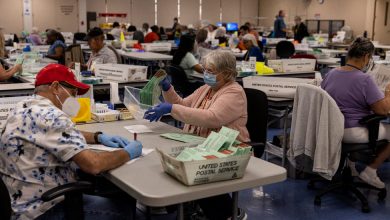One Illness Reminds Democrats They Have No Votes to Spare

WASHINGTON — It was the troubling development that Democrats holding a precarious 50-50 Senate majority had long been dreading: One of their colleagues suffered a serious medical episode, leaving them one vote short of a majority with a Supreme Court confirmation vote on the horizon.
Adding to the unnerving news was the fact that the ailing senator was not one of the chamber’s half-dozen octogenarians who have been the subject of running concern about their health. It was Senator Ben Ray Luján of New Mexico, a 49-year-old in his first term, who had what his staff described as a stroke.
“I did not know that. Wow,” Senator Jon Tester, Democrat of Montana, said on Tuesday, reflecting the shock he and his colleagues felt after being told of Mr. Luján’s condition. They quickly dismissed any worry about the state of their legislative agenda, saying such issues paled compared with their concern for their colleague’s welfare.
“It makes me worried about him,” Mr. Tester said. “He’s too young for that stuff.”
By Wednesday morning, Senator Chuck Schumer, Democrat of New York and the majority leader, was assuring senators from the floor that Mr. Luján was expected to make a full recovery and that in his absence, “the U.S. Senate will continue to move forward in carrying out its business.”
A senior aide to Mr. Luján said on Wednesday that he remained in the hospital, was recuperating well and would return in four to six weeks barring complications.
There were immediate ramifications, though, considering that Democrats must often produce 50 votes to overcome united Republican opposition, a fairly common situation this year. Some contentious nominations set to be before the Commerce Committee on Wednesday were pulled because the absence of Mr. Luján, who sits on the panel, meant Democrats did not have the votes to advance them over Republican resistance.
Given the even divide, Democratic leaders have already been scheduling the most partisan votes only when they can be sure that all of their senators will be on hand and that Vice President Kamala Harris will be available to break a tie.
As for the Supreme Court vacancy, the situation is not yet dire for Democrats, since no nominee has been announced and the Senate is weeks if not months away from the moment when Mr. Luján’s vote will be needed if no Republicans back President Biden’s pick. Democrats said on Wednesday that based on their understanding of Mr. Luján’s condition, they would expect him back in time.
“We don’t anticipate any difficulty,” said Senator Richard J. Durbin, Democrat of Illinois and the chairman of the Judiciary Committee. “We just hope he gets back real soon.”
But Mr. Luján’s condition was a stark reminder that Senate Democrats — who serve in an institution where nearly half of all members are over the age of 65 — are never more than one sudden illness away from losing their working majority. It prompted some Democrats who have been agitating for Mr. Biden to move more swiftly to nominate and confirm a replacement for Justice Stephen G. Breyer to step up their calls for a pick sooner rather than later, before some other unforeseen event sidelines another Democrat at an inopportune moment.
“I would encourage the president to expedite the schedule,” said Representative G.K Butterfield, Democrat of North Carolina, noting that President Donald J. Trump and a Republican-led Senate pushed through Justice Amy Coney Barrett’s nomination in record time, just before the 2020 election. “We’ve got a 50-50 Senate, and there can be emergencies that can tilt this in one direction or the other.”
How quickly to proceed has already emerged as a source of tension among Democrats.
Some, like Mr. Butterfield, are calling for the Senate to follow the rapid pace Republicans set when they confirmed Justice Barrett without a single Democratic vote in a matter of weeks, saying Republicans have established a new precedent from the slower timetables of the past.
But Mr. Biden, already facing criticism from some Republicans for promising to consider only Black women, appears to prefer an extended review of candidates, perhaps to show that the White House cast a wide net and was deliberate in making its choice. In addition, Justice Breyer plans to remain on the court through the end of the term in June, negating the need for immediate action.
Mr. Schumer, who traveled to the White House on Wednesday to discuss the upcoming nomination with Mr. Biden, has said he wants to act with deliberate speed. Mr. Durbin, who will oversee the confirmation hearing, said this week that he was seeking a middle ground between moving too precipitously and unnecessarily extending the proceedings.
But if Mr. Luján is not able to vote or another Democratic senator is sidelined, it could present a problem, particularly if Republicans oppose the nominee en masse.
“This is yet another complication for Senator Schumer as he advises the White House on who to pick for the Supreme Court and how to proceed with the nominee as quickly as possible,” said Jim Manley, a Democratic strategist who was a top aide to Senator Harry Reid, the majority leader when the party faced a similar situation in 2006.
In December of that year, Senator Tim Johnson, Democrat of South Dakota, had a cerebral hemorrhage, putting the slim, newly won Democratic majority in jeopardy. Though he was gone for months, Mr. Johnson ultimately returned the next fall and won re-election in 2008 despite continuing health struggles.
In another recent case, Senator Mark Kirk, Republican of Illinois, had a stroke in January 2012 and was gone almost an entire year. No requirement exists for senators to step aside for health reasons if they choose not to, and there are many earlier instances of ill senators being away from Washington for lengthy periods, forcing their colleagues to adjust accordingly.
With Democrats able to approve a nominee themselves with their 50-vote majority, Republicans have so far signaled that they do not intend to dig in too hard against the pick, allowing them to show that Supreme Court confirmations can be conducted without becoming hyperpartisan spectacles. But any uncertainty about the Democratic ability to produce a sure 50 votes could quickly change that calculation and give Republicans more leverage over the nominee and the proceedings themselves.
Based on what has happened in the past, Republicans will tread carefully, not wanting to be seen as trying to gain advantage from the illness of a colleague and recognizing that like many things in the Senate, the tables can quickly turn.
On Wednesday, Senator Mitch McConnell, Republican of Kentucky and the minority leader, said that the entire Senate was “praying and pulling” for Mr. Luján and that it “was encouraging to read that our friend and colleague is expected to make a full recovery.”
Though Mr. Luján’s medical issue was more serious, the Senate has already contended with frequent absences this year as members dealt with positive coronavirus tests and family issues, forcing leaders of both parties to keep close track of attendance to guide their scheduling. Mr. Luján’s condition and the approach of a Supreme Court debate have now put such issues in the spotlight.
“That’s just what we live with every day in a 50-50 Senate,” said Senator Debbie Stabenow, Democrat of Michigan. “We are all human beings, and something can happen to someone at any time.”
Emily Cochrane and Annie Karni contributed reporting.



